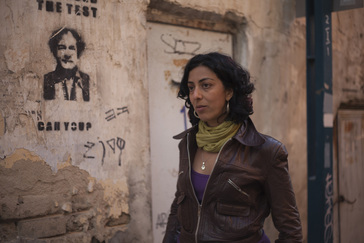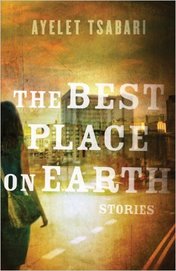 Ayelet Tsabari and I found each other via Twitter, and having now read her book, I thank Zeus for Twitter. The instantly friendly and delightful Ayelet sent me a copy of her short-story collection, The Best Place on Earth, which won the 2015 Sami Rohr Prize for Jewish Literature, and was nominated for the Frank O'Connor International Short Story Award. The stories cover various people and backdrops, as you'll see from her answers below, but they're united in being disarmingly honest and very skilfully built. They dig into their characters archaeologically, going deeper in a few pages than many novels do in 300. I gobbled this book. It made me restless, wanting both to travel and to get back to reading it whenever I could. I'm very glad to now know more about it and its author, who is Yemeni-Israeli-Canadian and lives in Toronto with her partner and little girl. I hope said little girl is letting her ma write more stories. 1. Did you have any alternate titles for your book? What made you pick "The Best Place on Earth"? Did that come to you fully formed at the start, or later? The title story was the first story I wrote, so from a very early stage I used it as my working title. Once I finished the collection, I toyed with other titles for the sake of considering everything but The Best Place on Earth always felt like the right title for a book that speaks about place, displacement and home. It is funny how many people immediately assume that it refers to Israel, when in fact it I borrowed it from the old British Columbia slogan… 2. How did you find the sense of an ending (especially odd with a collection)? Similarly to the title, the order of the stories fell into place effortlessly, without me having to do much shuffling. I felt like there was some movement forward in their arrangement, some kind of build-up. I also knew that I wanted to end with the title story, perhaps because to me the two sisters represented my two homes and identities, my two possible lives. And I liked that the last story corresponded with the first story, which takes place in Jerusalem. 3. Could you choose a piece of music to go with the book? Hard question! Since it’s a book of short stories, I may have to make a mixed tape for it… Or at least choose two! "Lovers in a Dangerous Time" is a song I hadn’t known before but a couple of people told me that reading my book made them think of it. I listened to the Barenaked Ladies version and loved it, so I’m including it in here. I think it’s especially suitable for Tikkun, the first story. Second is "Im Nin'Alu." by Ofra Haza. Israel’s biggest international music star was my idol growing up. She was young Yemeni woman (like me) who grew up in a small, impoverished neighbourhood in Tel Aviv. Her biggest claim to fame was her Yemeni Songs record, in which she sang old Yemeni Jewish songs and prayers remixed into dance numbers. The world went nuts! This is one of them and I think it would be a fine soundtrack to at least some of the stories. 4. The opening story, "Tikkun," is about a meeting of former lovers against the backdrop of a bombing in Jerusalem. Several of your stories involve reunions, most of which are uneasy. Can you talk about this? I started travelling early on in life, which eventually led me to settle in a new country, so my life has been a constant stream of goodbyes and reunions. Obviously, goodbyes are hard. But I hadn’t realized at first just how difficult reunions could be. Many of the stories in the book deal with cultural clashes within families, especially families of immigrants, which is something I witnessed in my own family growing up (as a granddaughter of immigrants), experiencing myself now as an immigrant to Canada, and will likely continue to experience as my Canadian child grows up. So I think many of the reunions represent that clash between those conflicting identities, or the gap between our expectations and reality. Every time I go home to Israel I find myself feeling out of place for the first few days or even weeks. I would miss home so much then get there and feel like I no longer belong. Then, I often feel that back in Canada to a lesser extent. It is a common immigrant story. 5. In the story "Invisible," describing a Filipina caregiver working illegally in Israel, the contrast of grinding dullness and sudden magic struck me. Can you discuss how this works in your writing? I know I sound like a hippie (that’s because I am) but I really couldn’t live through the “girding dullness” without opening myself up to some magic. That’s why I talk to strangers and walk the alleys and travel and do things outside my comfort zone as much as I can. My life is filled with crazy stories about strange coincidences and inexplicable gut feelings, and I can be unreasonably superstitious at times. When it comes to writing, I think I tend to write stories with a little more emotional intensity than the average Canadian writer—I have been accused of being a little too sentimental, which hurt at first, but then I decided to reconsider the term and reclaim it. I think too often what we call sentimentality is just feelings we can’t bear to feel. Writers, especially emerging writers, are often so scared of sentimentality that their work ends up being flat and the reader is less invested in the story and the characters. I think it’s a shame. There’s magic in passion and there’s magic in allowing ourselves to feel deeply. 6. Many of your characters exist on the edges, whether they are children, elderly, minorities, criminals, or observers. Why do these voices and stories draw you? I grew up Mizrahi and a girl in Israel, a position that is inherently marginalized, and then I became an immigrant and a minority in my new country. But regardless, I have always been comfortable in the margins, felt like I didn’t fully belong, and I don’t know that I have a good answer as to why. Perhaps some people are just born with a longing in their heart (see? Sentimental!), or perhaps it is something about losing a parent at such a young age that makes you feel like an outsider. I write about marginal characters because these are my people. I care about their stories and I want them to be heard. Mizrahi characters in particular have been underrepresented in Israeli literature so writing Mizrahi stories was a chance to rectify my childhood experience of reading books where people like me didn’t exist. 7. This is also an amazingly sexy book! Bodies and sex are integral to many of the stories. I have to ask how you avoid Bad Sex Award-type scenes when you write these parts. I sometimes think it has to do with my cultural background. Sex is a bit more explicit in Israel, or at least in parts of it—Israel is full of contradictions. When I first moved to Canada I was surprised I never heard people having sex through open windows in summertime… I have two rules about writing sex scenes: 1) no euphemism (unless you’re writing romance novels, then go right ahead). 2) Details, details, details. It’s a scene, right? So treat it like one and let it do what scenes do. It doesn’t have to be vulgar or graphic, but you have to provide straightforward details for us to feel immersed in the fictional dream. As a reader, I feel ripped off when I read sex scenes that are being glossed over, in a way that other scenes wouldn’t be. It feels like a copout.
0 Comments
Leave a Reply. |
ALIX HAWLEYI'm the author of My Name is a Knife, All True Not a Lie In It, and The Old Familiar. Archives
February 2021
Categories |

 RSS Feed
RSS Feed
